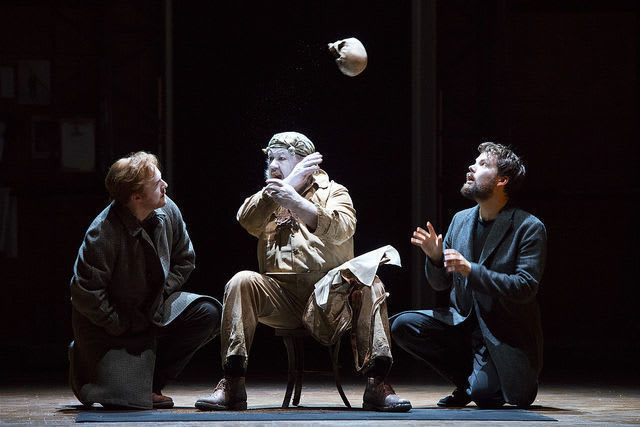Glyndebourne’s autumn tour fields its Hamlet as the triple-bill wild card—and it certainly is wild. And tragical, historical and comical (if not so pastoral).
Premièred in June in the Festival, Hamlet is a fascinating collaboration between composer Brett Dean, librettist Matthew Jocelyn, director Neil Armfield and Glyndebourne’s former musical director Vladimir Jurowski who bounced ideas and devices between them to create a quite thrilling ‘theatre of sound’.
Let’s get it out there at the outset: I really do not understand or appreciate dissonance (just how do they learn the parts?) but that does not hijack the fabulousness of this piece.
I took little from Dean’s score save for the complex layers, interesting melding of voices and the dynamic soundscape created by placement of musicians and voices, and use of percussion, electronics and household items. Conductor Duncan Ward keeps tight control in-the-round with foil flapping and plastic bottles crackling in balconies, stones clinking from above and the superb chorus leaving the stage to infiltrate the pit and auditorium.
Jocelyn plays fast and loose with Shakespeare’s words.
Drawing from both Quartos and the First Folio, he arranges and rearranges, reassigns and repeats to wring poetry and rhythm for a refreshing, vibrant—slightly different—tale of the rotten state of Denmark. Fortinbras is missing, bumbling Rosencrantz and Guildenstern (countertenors Rupert Enticknap and James Hall) stay put to bring continuing light relief and to add to the body count in the final carnage while Polonius (tenor Jeffrey Lloyd-Roberts) is nasty and conniving. The Players construct the "to be or not to be" monologue and Ophelia appropriates lines from her father and more.
Despite losing his soliloquies and so depth of character, an intense David Butt Philip commands and convinces as the troubled Prince, his beautiful mellow tenor stretching the emotional fabric of Hamlet’s mind with whispering, clacking and quacking disturbing his sanity.
Soprano Jennifer France is a compelling Ophelia. An innocent green girl indeed, her believable (but a tad too long) descent to madness is offset by effortless soaring notes, string harmonies and much chattering.
Brian Bannatyne-Scott’s bass is brought to thrill as Player 1, comic Gravedigger and the dishevelled, beer-bellied Ghost shuffling about in his dusty vest—rather aiding understanding of why Gertrude (mezzo Louise Winter) leapt swiftly into wedlock with the suave Claudius (baritone William Dazeley)—while baritone Gavan Ring is a sweet, fresh-faced Horatio.
A special nod goes to Patrick Terry who stepped up to sing Rosencrantz from the side of the stage to cover for Enticknap’s throat infection.
Alice Babidge clads Hamlet in dark overcoat and drainpipes to contrast the pastel 19th century slinky dresses and formal dinner jackets. All are bewilderingly white-faced somewhat fading into Ralph Myers’s elegant, light and bright court and starkly luminous in the darkness of below stairs and out in the cemetery.
Despite the long (nearly two hours) first act and dissonant score, Dean has created a keeper and a fascinating watch: a tremendous and brave rendering of a classic.
